Imagine walking into a lush garden filled with vibrant herbs and flowers. This peaceful place is where Ayurveda, an ancient holistic system, comes to life. It teaches us that true beauty comes from balance, not just on the outside, but from within.
Exploring Ayurvedic skin and hair care, we find natural remedies that can transform our beauty routines. These remedies nourish and rejuvenate, making our routines more effective.
By following Ayurvedic beauty tips, we discover a wealth of natural ingredients. These ingredients nourish us, unlike many products that can harm. This journey is about celebrating nature’s gifts and finding what works best for us.
As we learn more, we see how Ayurveda helps us achieve vibrant skin and healthy hair. It connects us to nature’s wisdom, guiding us toward true beauty.
Introduction: The Essence of Ayurveda

Ayurveda is an ancient healthcare system. It believes in balancing the body, mind, and spirit for true health. This approach sees physical health as connected to mental and spiritual health.
By following Ayurvedic principles, we can find natural beauty and vitality. This resonates deeply within us.
Exploring Ayurveda, we see beauty goes beyond surface treatments. It comes from connecting with our inner selves. This leads to natural skin and hair care, showing the power of holistic practices.
As we learn more about Ayurveda, we see it nurtures both our outer and inner selves. It inspires us to care for our true essence.
Understanding Ayurveda and Its Principles
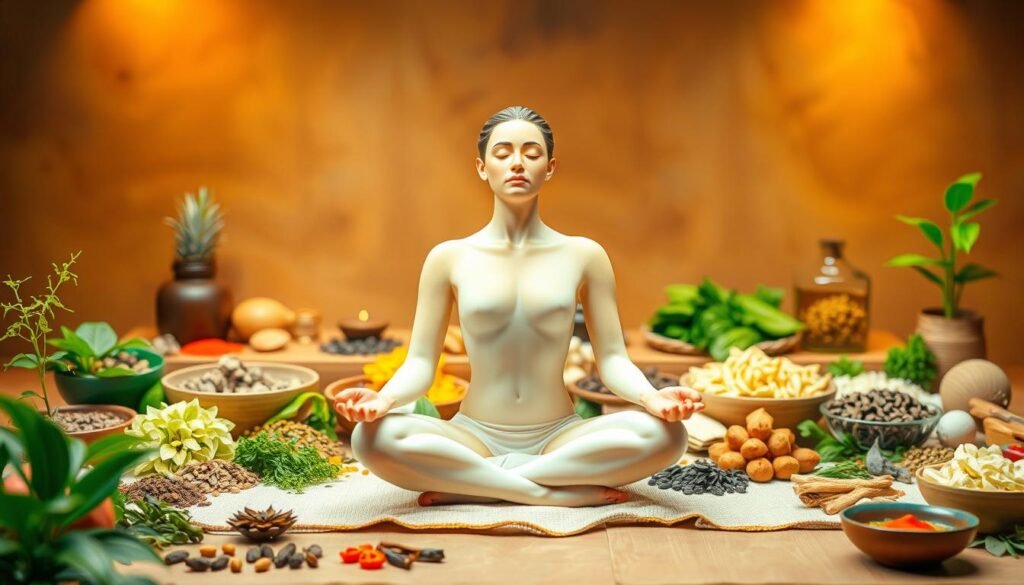
Ayurveda is a holistic approach to health and beauty. It’s based on ancient wisdom, focusing on balance between mind, body, and spirit. The Tridosha system is at its core, with three energies: Vata, Pitta, and Kapha. Each person has a unique mix of these doshas, shaping their physical and emotional traits.
Knowing our dosha helps us understand ourselves better. It guides us in choosing the right skin and hair care. For example, Vata types need nourishing oils, while Pitta types seek cooling ingredients. Kapha types benefit from purifying treatments.
Embracing Ayurveda boosts our self-awareness and connects us to nature. It brings harmony to our lives, leading to healthy skin and hair. Adopting these practices enriches our lives, making them more fulfilling and health-focused.
Why Choose Ayurvedic Skin and Hair Care?
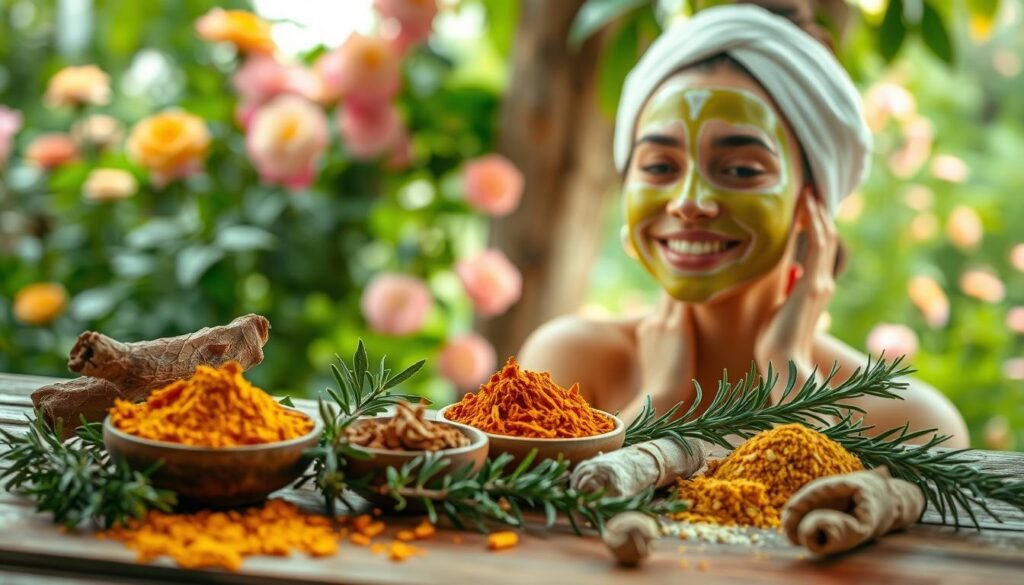
More people are looking for organic options in today’s market. Ayurvedic skin and hair care is becoming popular. It’s based on ancient health wisdom.
These products use natural ingredients instead of harsh chemicals. This makes them gentle yet effective for our skin and hair.
Using Ayurvedic treatments can really improve how our skin and hair look. They use natural ingredients like neem, turmeric, and aloe vera. These ingredients nourish and support our overall health.
It’s all about treating our body and beauty as one. Ayurvedic care focuses on what’s best for each person. It’s a way to care for ourselves without harming the planet.
Skin and Hair Care the Ayurvedic Way
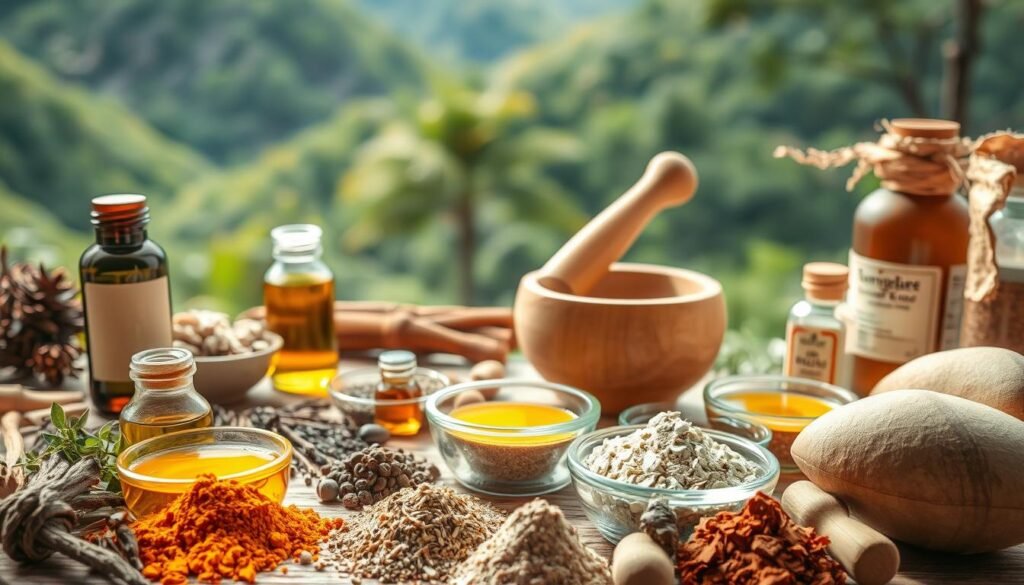
Embracing Ayurvedic skin and hair care means connecting with nature and ourselves. It’s about understanding beauty in a holistic way. We focus on care that fits our unique needs.
At the heart of this philosophy is balanced beauty. It’s about using products and routines that match our physical and emotional health.
Balanced Approach to Beauty
Ayurveda teaches us to find balanced beauty by choosing products that match our skin and hair types. It’s different from the usual one-size-fits-all approach. Ayurveda encourages us to know our individual needs.
This balanced approach leads to a more effective and caring beauty routine.
Understanding the Tridosha
Ayurveda’s Tridosha understanding helps us understand our energetic types: Vata, Pitta, and Kapha. Each type affects our physical and emotional traits, influencing our beauty needs. Knowing our Dosha helps us pick the right products for our unique beauty.
Benefits of Using Ayurvedic Ingredients

Exploring Ayurvedic ingredients shows us a way to healthier skin and hair. These natural parts have been used for centuries. They offer gentle yet effective solutions that many modern products lack.
Herbs like aloe vera and turmeric are celebrated for their healing powers. They also boost vitality and overall health.
Aloe vera is a powerful moisturizer, key in natural skin care. It soothes irritation, promotes healing, and keeps skin elastic. Turmeric brightens the skin and reduces blemishes with its anti-inflammatory and antiseptic qualities.
Using Ayurvedic ingredients changes beauty rituals, adding nourishment from nature. This approach not only improves looks but also connects us to ourselves and well-being.
Popular Ayurvedic Herbs for Skin Care
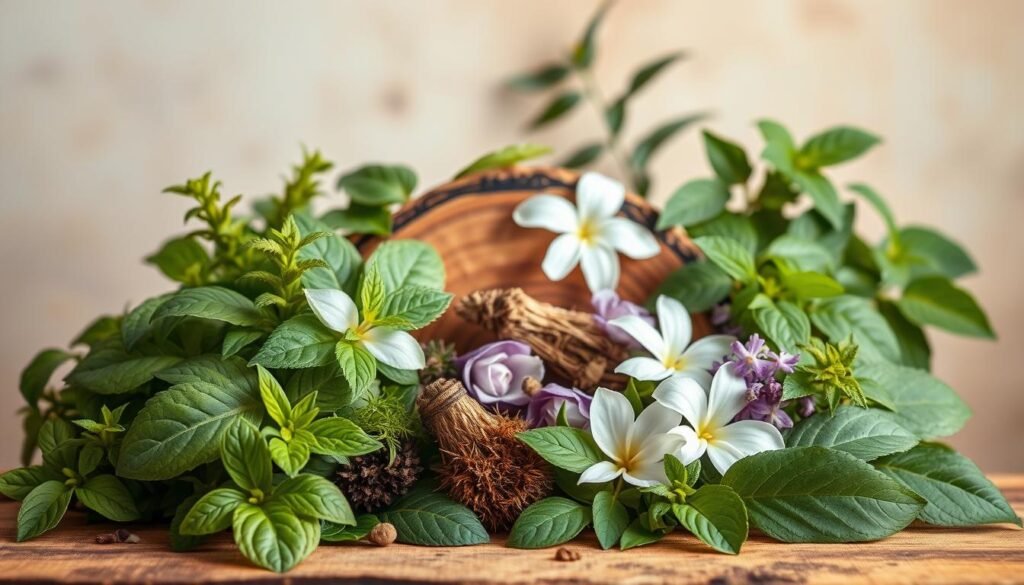
Natural skin care often turns to Ayurvedic herbs for their benefits. These herbs can improve our skin’s health and look. Let’s look at aloe vera, turmeric, and saffron, each with special benefits for the skin.
Aloe Vera: The Hydrating Wonder
Aloe vera is known for its moisturizing power. It’s great for dry or sensitive skin. It also has vitamins and minerals for a healthy glow. You can use aloe vera gel or products with it in your beauty routine.
Turmeric: Nature’s Antiseptic
Turmeric is more than just a spice. It fights inflammation and bacteria, making it key in Ayurvedic skin care. It helps with acne, reduces redness, and improves skin tone. Mix turmeric with yogurt for a face mask that brightens and soothes.
Saffron: Brightening and Even Skin Tone
Saffron is famous for making skin brighter. It evens out skin tones and adds radiance. It’s full of antioxidants, keeping skin young. Use saffron oil or cream for a glowing, smooth skin texture.
Ayurvedic Remedies for Common Skin Issues
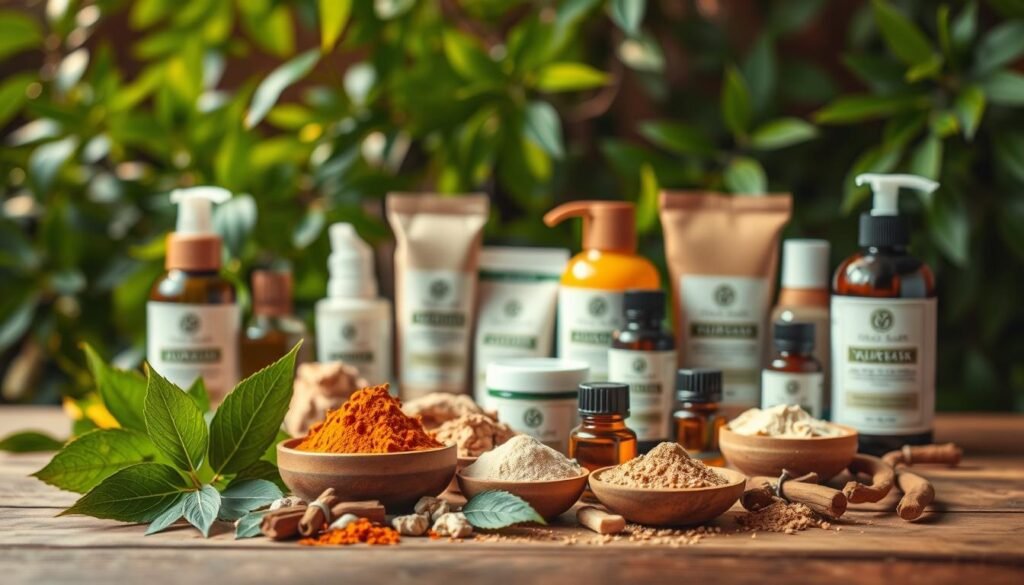
Using Ayurvedic remedies can help with common skin problems like acne and dryness. These natural methods use ingredients that really nourish the skin. They don’t just cover up issues.
For acne, try a paste from neem leaves. Neem is great because it fights bacteria and soothes red skin. Using it often can make your skin clearer.
If your skin is too dry, mix coconut oil with turmeric. Coconut oil moisturizes well, and turmeric helps your skin glow again.
Uneven skin tone is another big issue. A mix of sandalwood powder and rose water can fix this. Sandalwood makes your skin tone even, and rose water keeps it hydrated. This makes your skin look brighter and more even.
| Common Skin Issue | Ayurvedic Remedy | Benefits |
|---|---|---|
| Acne | Neem Paste | Reduces inflammation and antibacterial effects |
| Dryness | Coconut Oil & Turmeric | Deeply moisturizes and restores vitality |
| Uneven Complexion | Sandalwood Powder & Rose Water | Evens tone and hydrates |
Adding these Ayurvedic remedies to your skincare routine can really help. They not only solve specific problems but also make your skin healthier overall. Discover the amazing effects of natural ingredients for a glowing complexion.
Herbal Hair Care Products: Nature’s Best
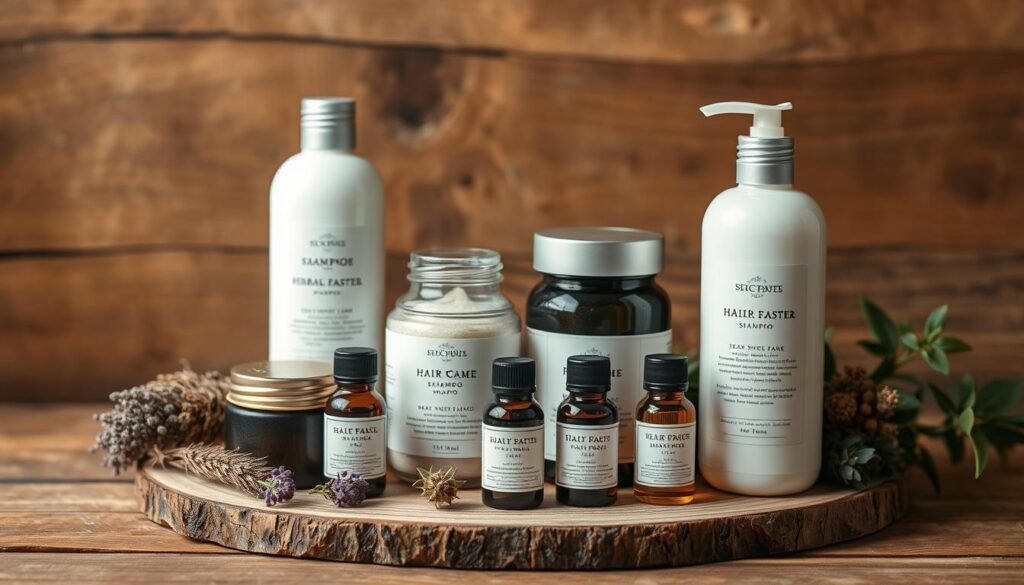
Herbal hair care products are a top pick for many looking for vibrant, healthy hair. They use natural ingredients to solve hair problems in a sustainable way. Using herbal products connects our hair care to nature, improving both beauty and health.
Ayurvedic hair care is all about balance and nourishment, based on ancient wisdom. Herbal products, like those from Khadi Natural and Just Herbs, help fix dryness, dandruff, and hair loss. They avoid harsh chemicals, focusing on natural, holistic care.
Adding natural solutions to our daily hair care strengthens our bond with nature. It also boosts hair health and supports a green beauty routine. Choosing herbal products is more than a choice; it’s a dedication to our hair’s health through nature’s power.
Ayurvedic Hair Growth Techniques
Ayurvedic hair growth techniques are becoming more popular. They focus on natural ingredients and traditional practices. This approach helps nourish hair and scalp health.
Essential oils like bhringraj and jatamansi are key. They help rejuvenate hair follicles and strengthen hair strands.
Essential Oils for Hair Health
Essential oils for hair offer many benefits. They improve hair health and provide targeted nourishment. Bhringraj oil stimulates hair growth.
Jatamansi oil calms the scalp and reduces stress, which can cause hair loss. Using these oils regularly supports strong hair growth and improves scalp health.
Herbal Hair Masks for Nourishment
Herbal masks are a great addition to hair care. They are made with natural ingredients for deep conditioning and nourishment. Here are some effective herbal mask recipes:
- Amla and Yogurt Mask: Amla powder mixed with yogurt strengthens hair and boosts shine.
- Fenugreek and Coconut Milk Mask: Soaked fenugreek seeds blended with coconut milk nourish follicles, promoting growth and thickness.
- Brahmi and Neem Mask: This herbal mixture soothes the scalp while combating dryness and flakiness.
Adding these Ayurvedic hair growth techniques to your routine can help. They create a healthy environment for your hair, improving its look and vitality.
Creating an Ayurvedic Skin Care Routine
Starting an Ayurvedic skin care routine can make your skin healthier and more vibrant. It involves using natural ingredients that match your skin type and dosha. A good routine includes cleansing, toning, and moisturizing for a complete experience.
Cleansing is key in an Ayurvedic routine. Use natural herbal cleansers like chickpea flour or neem powder. They clean your skin without taking away moisture. After cleansing, toning is important. Rosewater or aloe vera can help balance your skin’s pH and get it ready for more treatments.
Moisturizing is a big part of your routine. If your skin is dry, try coconut or sesame oil for hydration. For oily skin, jojoba oil is a better choice. Using these products regularly is key to lasting results.
Here’s a sample Ayurvedic skin care routine for different doshas:
| Dosha | Skin Type | Recommended Products |
|---|---|---|
| Vata | Dry | Coconut Oil, Cream Cleanser, Rosewater Toner |
| Pitta | Sensitive | Chamomile Cleanser, Aloe Vera Gel, Light Moisturizer |
| Kapha | Oily | Neem Face Wash, Witch Hazel Toner, Jojoba Oil |
By adding this Ayurvedic routine to your daily life, you connect with your skin in a caring way. Each step—cleanser, toner, and moisturizer—works together to enhance your natural beauty.
Ayurvedic Beauty Rituals for Radiant Skin
Exploring Ayurvedic beauty rituals can greatly improve your skin health. These ancient practices aim for balance and harmony. They make your daily routine more holistic.
Facial abhyanga is a great ritual. It uses warm herbal oils for a massage. This nourishes your skin and boosts circulation. It’s also relaxing, making it great for self-care.
Herbal masks are another key practice. They’re made from turmeric, sandalwood, and neem. These masks nourish and hydrate your skin, making it glow.
Detoxifying cleanses are also important. They use herbal concoctions and natural exfoliants. These cleanses remove impurities and refresh your skin.
We’ve made a table to help you start these rituals. It shows the main rituals and their benefits:
| Ritual | Benefits |
|---|---|
| Facial Abhyanga | Nourishes the skin, improves circulation, promotes relaxation |
| Herbal Masks | Addresses skin concerns, hydrates, enhances natural glow |
| Detoxifying Cleanses | Removes impurities, rejuvenates skin, supports overall health |
Adding these Ayurvedic beauty rituals to your daily life is a step towards radiant skin. It also honors the ancient traditions of Ayurveda.
Customizing Your Regimen According to Your Dosha
Knowing your dosha is key to a great skincare routine. Ayurveda’s dosha system has three main energies: Vata, Pitta, and Kapha. Choosing products that match your dosha helps your skin get the best care.
Vata: Nourishing and Hydrating Products
Vata types often face dry skin. They need hydrating and nourishing products. Use oils like sesame or almond oil and creamy moisturizers to keep skin moist.
Ingredients like shea butter and hyaluronic acid are great. They fight dryness and make skin more elastic.
Pitta: Calming and Soothing Ingredients
Pitta people might get sensitive and inflamed skin. To soothe it, use calming ingredients. Aloe vera and cucumber extracts are good for irritated skin.
Stay away from harsh chemicals. Instead, choose gentle products with rose water and chamomile. They keep your skin balanced and cool.
Kapha: Purifying and Balancing Treatments
Kapha types deal with too much oil and dirt. To fix this, pick purifying treatments. Use light, non-greasy products with tea tree oil and clay to clean out dirt.
Exfoliating with gentle scrubs helps too. It makes your skin clearer and stops blockages.
Ayurvedic Diet: The Foundation of Healthy Skin
Our internal health greatly affects how we look. An Ayurvedic diet helps nourish our bodies with balanced nutrition. This boosts our skin’s health. By eating the right foods, we build a strong base for glowing skin.
Let’s look at how our diet impacts our beauty.
Foods That Enhance Your Skin Health
Some foods are great for our skin. They match Ayurvedic principles and are full of nutrients. Here are some to add to your meals:
- Fresh fruits and vegetables — Rich in antioxidants, they combat free radicals.
- Nuts and seeds — Provide healthy fats and essential vitamins.
- Whole grains — Offer fiber and promote digestion, essential for detoxing the body.
- Spices like turmeric and ginger — Known for their anti-inflammatory properties.
- Herbal teas — Hydrate and support detoxification.
The Connection Between Diet and Beauty
The link between diet and beauty is clear. Eating right improves our skin’s texture, tone, and health. An Ayurvedic diet focuses on balance, giving our bodies what they need.
By choosing the right foods, we boost our health and beauty. This approach helps us connect with our bodies better. It leads to a glow that goes beyond looks.
Detoxifying with Ayurveda for Better Skin and Hair
Detoxification is key for clear skin and healthy hair. Ayurvedic detox cleanses the body of impurities. This boosts overall health. To start a detox journey, try simple Ayurvedic methods for skin and hair.
Herbs like Neem and Triphala are great for detoxing the skin. Green tea helps flush out toxins and improves skin. These herbs and teas can make your skin clearer.
Drinking plenty of water is also important. Warm water with lemon and ginger helps the body and digestion. This makes your skin and hair look better.
Starting an Ayurvedic detox is good for your skin, hair, and body balance. Yoga and meditation help connect with wellness. They show how mind, body, and beauty are linked.
Additional Ayurvedic Practices for Overall Wellness
Ayurveda offers more than just diet and topical treatments. It helps us achieve mental and physical health. Meditation is key for better skin and a balanced life.
Meditation and Its Impact on Skin Health
Meditation calms the mind and promotes *internal balance*. This is vital for radiant skin. It reduces stress, which helps skin conditions.
Regular meditation improves skin appearance. It makes us look younger.
Here are some meditation benefits for skin:
- Reduces Stress: Lowering cortisol levels can minimize breakouts and skin irritations.
- Enhances Circulation: Improved blood flow delivers essential nutrients to the skin, supporting its vitality.
- Encourages Healthy Habits: A calm mind supports consistency in skincare routines and overall well-being.
Meditation is a vital part of Ayurvedic practices. It helps us on our journey to *overall wellness*. This approach combines mental, physical, and spiritual beauty, showing true wellness starts from within.
The Future of Ayurvedic Products in Beauty Industry
The beauty industry is changing fast, and Ayurvedic products are leading the way. More people want to know what’s in their skincare and haircare. Ayurvedic products are becoming popular because they are natural and effective.
There’s a big push for natural beauty products now. Brands are turning to Ayurvedic medicine for inspiration. This move towards natural and sustainable beauty is a big trend in the industry.
Ayurvedic products are set to play a big role in the future of beauty. They combine ancient wisdom with modern science. This blend of nature and research makes our beauty routines better and more caring.




